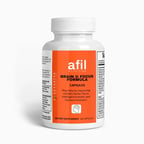Ruthenium
Ruthenium is a rare metal used in tech and industrial products. Even if considered low-toxicity, it can trigger immune or oxidative stress responses in sensitive individuals—especially those already reacting to platinum group metals. Avoid exposure, support detox, and rebalance minerals to help reduce symptoms.
🔩 What is Ruthenium?
Ruthenium is a rare, silvery-gray metal in the platinum group, often used in electronics, solar cells, catalytic converters, and certain alloys to improve hardness and corrosion resistance. While it's not considered highly toxic in small amounts, ruthenium compounds or particles can still trigger immune reactions or cellular stress, especially in people with metal sensitivities or compromised detox pathways.
🤔 Why Do I Have a Sensitivity to Ruthenium?
Even though ruthenium is considered stable and inert in many forms, you may still react to it due to cross-reactivity, low-level accumulation, or sensitivity to metal particles. Here's why your body might be responding:
-
Cross-Reactivity with Other Platinum Group Metals
If you're sensitive to platinum, palladium, or rhodium, your immune system may also overreact to ruthenium due to its structural similarities, leading to inflammation, fatigue, or rashes. -
Exposure to Metal Dust or Nano-Particles
Ruthenium is used in electronic manufacturing, jewelry plating, and catalytic materials, which can release fine metal particles into the air. Inhalation or skin contact may trigger respiratory or immune symptoms in sensitive individuals. -
No Biological Role = No Tolerance Mechanism
Unlike essential minerals, ruthenium has no function in the human body, and your system may view it as a foreign substance, increasing the chance of immune reactivity or poor detox clearance. -
Tissue Irritation or Oxidative Stress
Some ruthenium compounds can cause oxidative stress in the lungs or soft tissues, especially in people with weakened antioxidant defenses or histamine sensitivity.
🛠️ What Can I Do About It?
To reduce symptoms and support recovery from ruthenium sensitivity:
-
Avoid contact with ruthenium-containing electronics or coatings, especially if you’re exposed through work or jewelry
-
Support detox and mineral balance, especially magnesium, zinc, and selenium
-
Reduce total metal exposure from other sources (like nickel or palladium)
-
Use air filtration or masks if around metal dust or fumes
-
Retest after 8 weeks to track improvement in symptoms
💊 Which Supplements Can Help with a Ruthenium Sensitivity?
- Glutathione – Supports detoxification and protects against heavy metal stress.
- Vitamin C – Aids in immune regulation and metal elimination.

- NAC (N-Acetyl Cysteine) – Helps reduce oxidative stress from metal exposure.
- Chlorella & spirulina – Assist with chelation and heavy metal detox.

- Zinc – Helps protect against metal-induced oxidative damage.

🌟 Why Might I React to Ruthenium but Not Other Metals?
If you're reacting to ruthenium but tolerate other metals, it's likely due to its unique chemical structure, platinum-group behavior, and how your body recognizes or processes it differently. Here's why ruthenium may trigger a reaction when other metals don’t:
-
Cross-Reactivity with Platinum-Group Metals
Ruthenium is part of the platinum group, like platinum, palladium, and rhodium. If you’re sensitive to any of these, your immune system may see ruthenium as chemically similar, causing inflammation or immune flare-ups. -
No Biological Role or Detox Pathway
Unlike essential metals like zinc or iron, ruthenium has no known biological use, so your body lacks a mechanism to safely process, buffer, or excrete it, increasing the chance of accumulation or reactivity. -
Industrial or Particle Exposure
Ruthenium is used in electronics, coatings, and catalytic converters. Fine metal particles or dust may be inhaled or absorbed through the skin—causing issues even without direct handling, especially in urban or industrial environments. -
Triggers Oxidative Stress in Sensitive Individuals
Some ruthenium compounds can generate oxidative stress, especially if your antioxidant defenses (like glutathione) are low. This can cause symptoms like fatigue, brain fog, or joint pain—reactions you may not get from metals your body handles better. -
You May Be More Sensitive to Non-Nutritional Metals
Ruthenium, like other non-essential metals, may overwhelm your system if you're already under detox stress, while essential metals are better regulated and tolerated. -
Mast Cell or Immune System Reactivity
People with mast cell activation or chemical sensitivity may react to ruthenium—even in trace amounts—because the body views it as a foreign threat, unlike more familiar minerals like magnesium or calcium.
Common Sources of Ruthenium Exposure
- Jewelry plating (especially mixed with platinum or white gold)
-
Catalytic converters (automotive and industrial)
-
Electronics and chip manufacturing
-
Solar panels and chemical sensors
-
Certain scientific instruments and lab materials
Alternatives (if tolerated):
-
Jewelry made from titanium, surgical-grade stainless steel, or ceramic
-
Avoid dust from industrial metals or electronics recycling
-
Choose ruthenium-free dental and implant materials
.png?width=100&height=75&name=AFIL%20Logo%20(1).png)